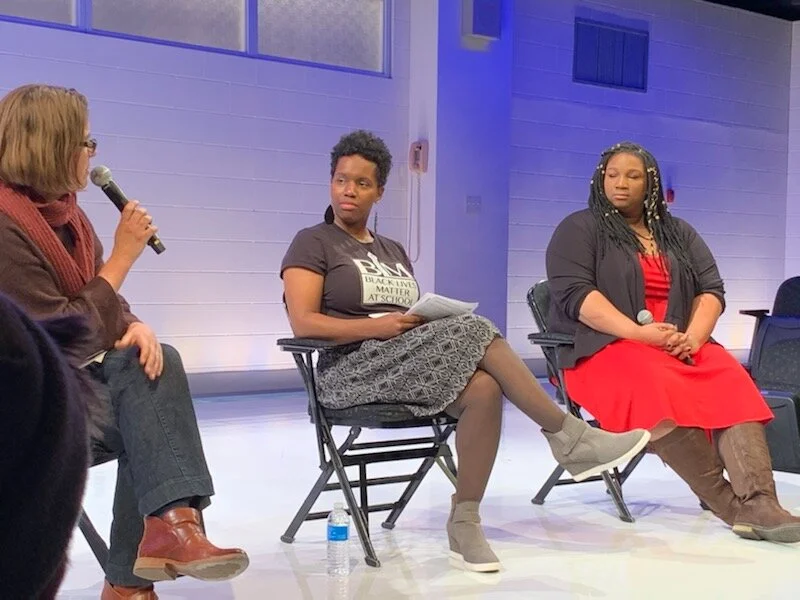Discussion of “Pipeline” and the Black Lives Matter at School Week of Action
By Nancy Salazar
On Friday, February 7, at Studio Theatre in Washington, D.C., audience members gathered for a post-play discussion of Dominique Morisseau’s play Pipeline, a drama following a family navigating through systems of racism in public and private school. Teaching for Change Associate Director, Allyson Criner Brown, and Ashley Williams, a high school history teacher and BYP100 DC member, engulfed in conversation that critically explored observations and drew connections from Pipeline to the annual Black Lives Matter at School Week of Action (February 3–7, 2020).
The conversation began with takeaways from Williams and Criner Brown on the play, including the intertwining of Gwendolyn Brooks’ poem “We Real Cool,” and the dual role and hardships facing educators of color like the main character Nya, who is both a single parent and high school teacher. Nya is determined to not only give her son the best opportunities, but also to shield him from the forms of racism he might experience attending the high poverty public school that is in their neighborhood, where Nya teaches.
Criner Brown commented on the playwright’s choice of the Native Son character Bigger Thomas to juxtapose against the character Omari, Nya’s seventeen-year-old son. A moment that resonated with Williams was hearing the phrase “monstrous rage” applied to Omari. Criner Brown made a direct connection of experience of Omari in Pipeline to the annual Black Lives Matter in Schools Week of Action: “The rage that our students may come up against, they should not own that. The rage that Omari identifies in Bigger Thomas and in himself… that wasn’t seventeen years in the making, that was hundreds of years in the making. One way to think about it is to take that burden of that rage away from the students and to say we’re going to take this [Black Lives Matter at School Week of Action] where we’re looking at the things that impact you, the systems that are at play that create the kinds of structures that do not support you in reaching your full human potential.”
The National Black Lives Matter at Schools Week of Action campaign takes place annually in cities across the United States to promote a set of national demands based on the Black Lives Matter guiding principles that focus on improving the school experience for students of color. While unpacking the play and looking at systems of racism in the context of both the drama and in real-life, Williams shared a reality that her students have to face daily. “Kids are used to going through metal detectors at schools, used to taking off their sneakers and putting them through machines every morning. Some kids don’t even know that that’s not normal. Just because this is what happens daily, it doesn’t make it right.” Criner Brown elaborated on the Week of Action explaining, “Black Lives Matter at School Week of Action comes from a national committee of educators who have taken these principles and said let’s make this apply to our students and our schools so that we’re both fighting for the systems and the structures that our students need, but also bringing it directly to their learning. Bringing what happens outside of the classroom into the classroom.”
Audience members were treated to two rich experiences Friday night: a riveting play and a discussion that challenged them to make real world connections to students, educators, and schools here in Washington, D.C. Each person in the room left with tips and thoughts on what we can ALL do to show up for — and with — our students of color.

